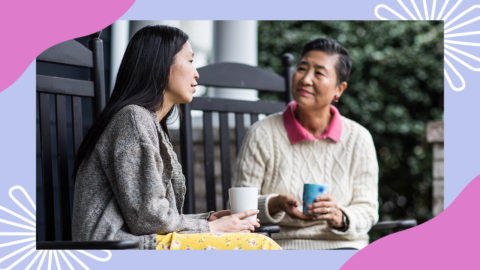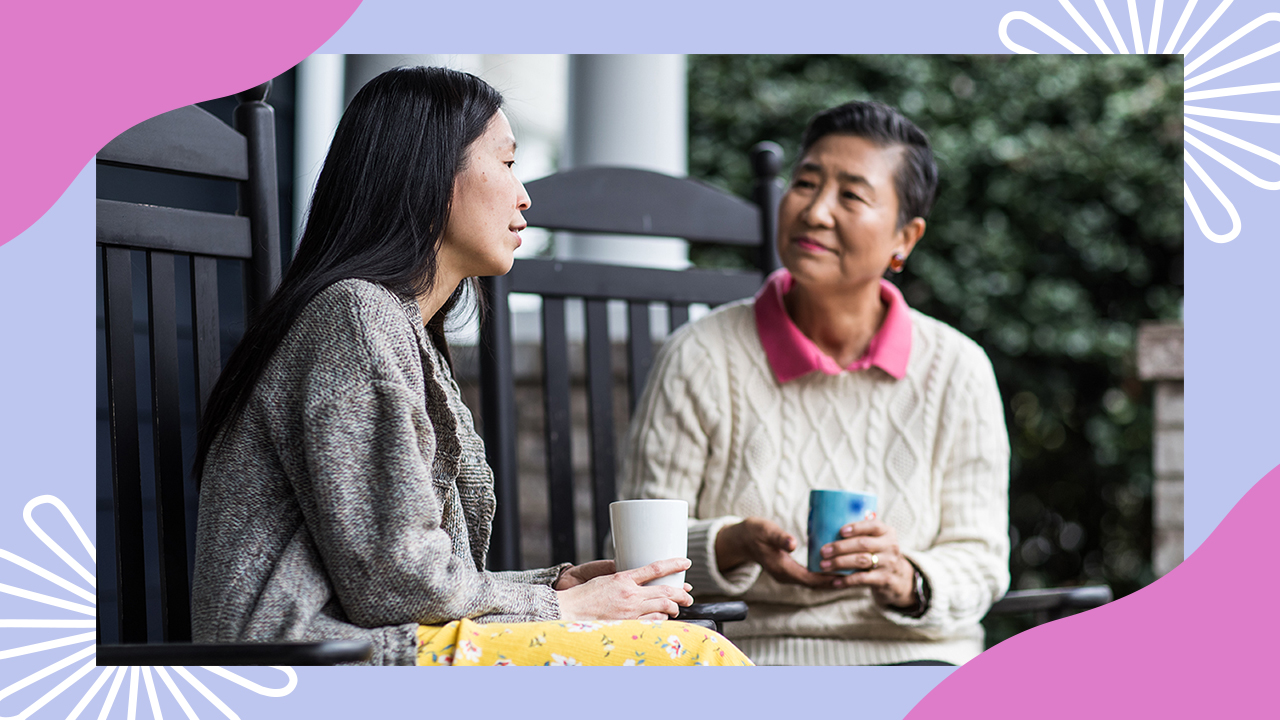How to Talk to Your Family About Anti-Black Racism When You’re a POC
It's different than the conversations our white friends are having

Having conversations about race with your family are always challenging to navigate—but equally necessary to make real change. They become even more complicated when you are a person of colour yourself, trying to get through to family members who still romanticize the American dream, i.e. the idea that everyone has an equal opportunity to “make it” (which, by the way, is even more romanticized in Canada.)
Perhaps you have an uncle who claims he’s not racist but says, “all lives matter.” Or a sibling who casually uses AAVE without understanding the implications of that kind of cultural appropriation. Challenging these behaviours will be emotional, and they will most certainly drain you, but it’s nothing compared to the pain that Black people have been enduring for centuries. This is why it’s fundamental.
I’ve been chatting with some fellow non-white friends about how they started talking to their families. My friend Tila says, “Lucky for me, my parents and I share a lot of the same political opinions, generally speaking. But the few times that we disagree, many times over racism—those conversations get intense and emotional. I’ve been asking my parents more and more about their upbringing and their personal experience with racism (they are both Hindus that lived through Bangladesh’s Independence War in 1971, and were refugees in India for a time). I’ve tried to be more mindful of their trauma and their experience as first-generation immigrants to Canada, while also standing my ground, which is a delicate balance. It can be frustrating. But, for the most part, I see these conversations as very productive.”
Just like Tila, my parents and I share more or less the same political views, but our conversations on race also tend to get a little intense. We’re Filipino-Canadian, and the Philippines has a long history of colonization. I find that the American influence is still prominent today, given we have been colonized for 48 years. A lot of my family members only see America and Canada as wonderful places to start a life.
I used to get angry when they didn’t understand that racism, especially against Black and Indigenous Canadians, exists here, too. But over the years, I’ve figured out better ways to approach these difficult discussions. Now, I try my best to talk to them calmly and be open to any questions or feedback. I think this has helped them be more willing to accept the information I’m presenting, and see where I’m coming from.
Yemi Otukoya, MSW, RSW of Black Mental Health Matters, says that our frustration is often fuelled by “a subtle but intense insistence that things should not be as they are.” In other words, we feel angry at the unfair state of the world, and can bring that energy into these conversations, which is detrimental to any real discourse.
“We imagine a different world was there, then cry out because it does not exist. We need to deal with the fact that things are the way they are rather than how they ‘should be.’ In order to stay calm, we need acceptance, which is a necessary precondition for making any substantive change. Once we face the facts and channel all energy wisely, I believe we may be in a better place to take the next step.”
Below are some tips on how you can talk to your family about racism. These are things I’ve learned from my own experience—they are working for me, and I hope they work for you, too.
Where to start
Educate yourself
You don’t need to know every detail of Canadian history before you can start a conversation on race, but you should familiarize yourself with notable instances of systemic racism, such as Africville (which most of us were not taught about in school). In addition to our good friend Google, there are numerous books, films, documentaries and podcasts by Black authors that make information much easier to digest.
Consider who you’re talking to
What’s their current view on racism? How have they reacted in tough conversations before? It’s important to remember that people don’t think the same way that you do. Don’t expect a specific outcome and keep an open mind.
Be prepared
Chances are, whoever you’re speaking to will counter-argue with their own opinion. Think about the potential questions and statements you might receive and prepare answers for them. (More on that below.)
Try to stay calm
It’s easy to get caught up in the heightened emotions of the moment. Try not to raise your voice or point fingers, and be open to listening. Don’t let your feelings get in the way of your message.
Share your genuine thoughts
Why are you bringing up this conversation in the first place? What’s your own opinion? Putting your arguments into a personal context can often help make them more relatable. For example, talk about your privilege and how it differs from a Black person’s experience. Use yourself as an example.
How to respond to common statements about race
“But, all lives matter”
By no means does saying Black Lives Matter mean they are the only lives that matter. It means they are in crisis—a lot of people are pointing to the analogy of the burning house to help people understand. Black people experience racial discrimination and police brutality at a higher rate than other groups. Saying “all lives matter” diminishes the fact that systemic racism affects them differently.
“I just don’t understand why they have to riot and loot”
First of all, most protesters are peaceful. But it’s not our place, as non-Black people, to dictate how Black individuals should respond to the trauma of their community being murdered by police. A store or a road can be rebuilt, but someone’s life can’t be given back.
“Not all cops are bad”
Sure, maybe you know someone who’s a cop and is nice. However, that doesn’t change the fact that the criminal justice system is designed to discriminate and punish Black, Indigenous and poor people. Don’t believe me? Just look at America’s 13th Amendment and Canada’s lack of action after the MMIWG report was released.
“I also experience racism”
Yes, non-Black POC experience racism. Racism comes in different forms and impacts the day-to-day lives of people of colour, but most especially Black people. I think about the colourism that’s been passed down to Filipinos for generations as well—”fairer skin” is preferred over “darker skin.” Why is that? We benefit from the privilege of being non-Black every day.
The best thing we can do with our privilege is to reflect on the role we each play in society and truly work on how we can be effective allies. It’ll most likely take more than one sitting to get your family to understand why the Black Lives Matter movement is important and why they should care. Don’t give up! If you’re going to start, be committed.
Keep in mind, you don’t necessarily have to do this in person. You can start with a simple text. Letters for Black Lives is an excellent resource for templates and examples, and are even translated in different languages. Tila says this has been beneficial for her. “Last time I spoke to my dad, after having read the letter, he told me how wholeheartedly he agreed and how proud he was of us for being so engaged politically and for including him. My dad has actually shared the letter with some friends and family members, which has me elated.”









